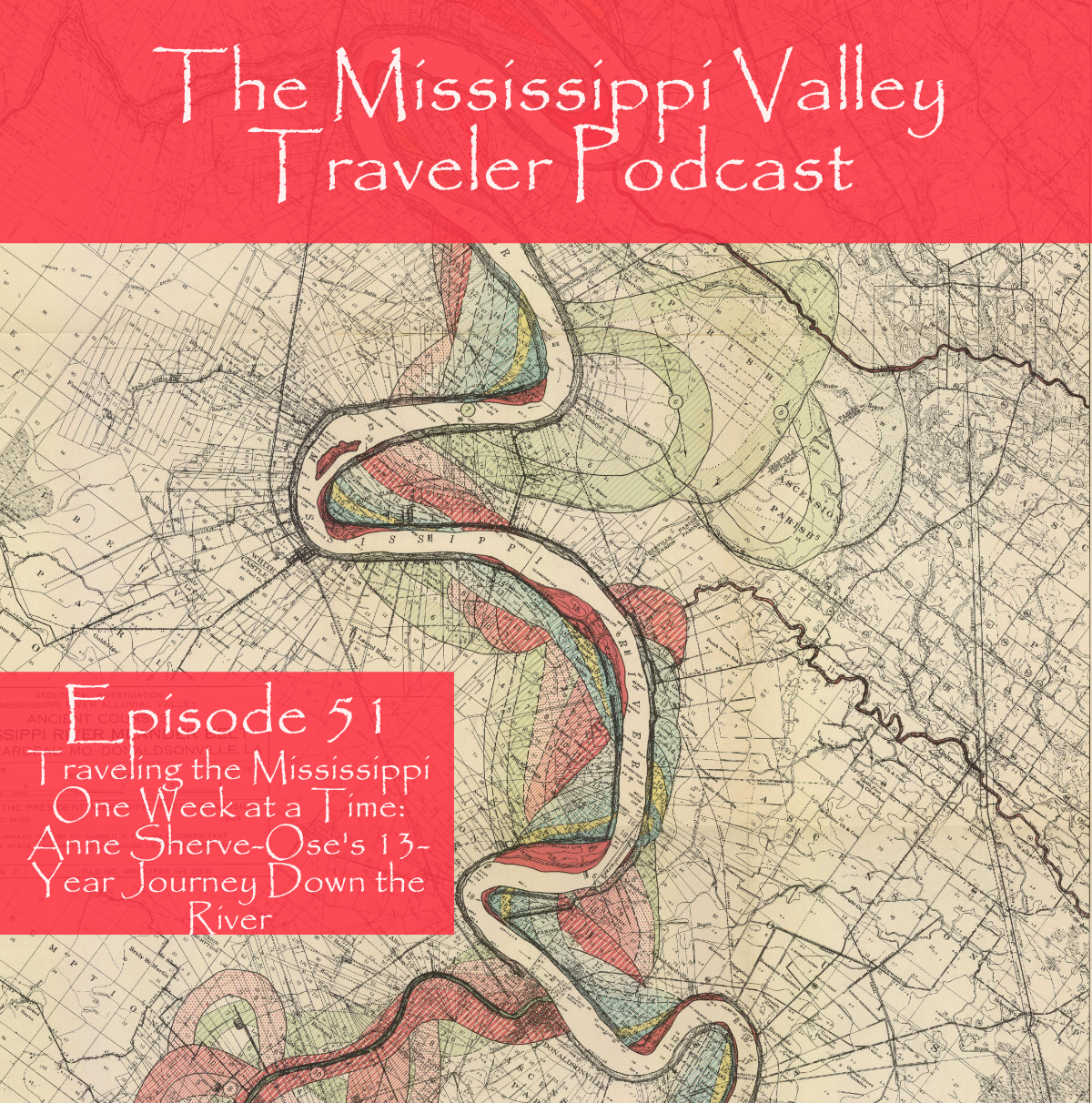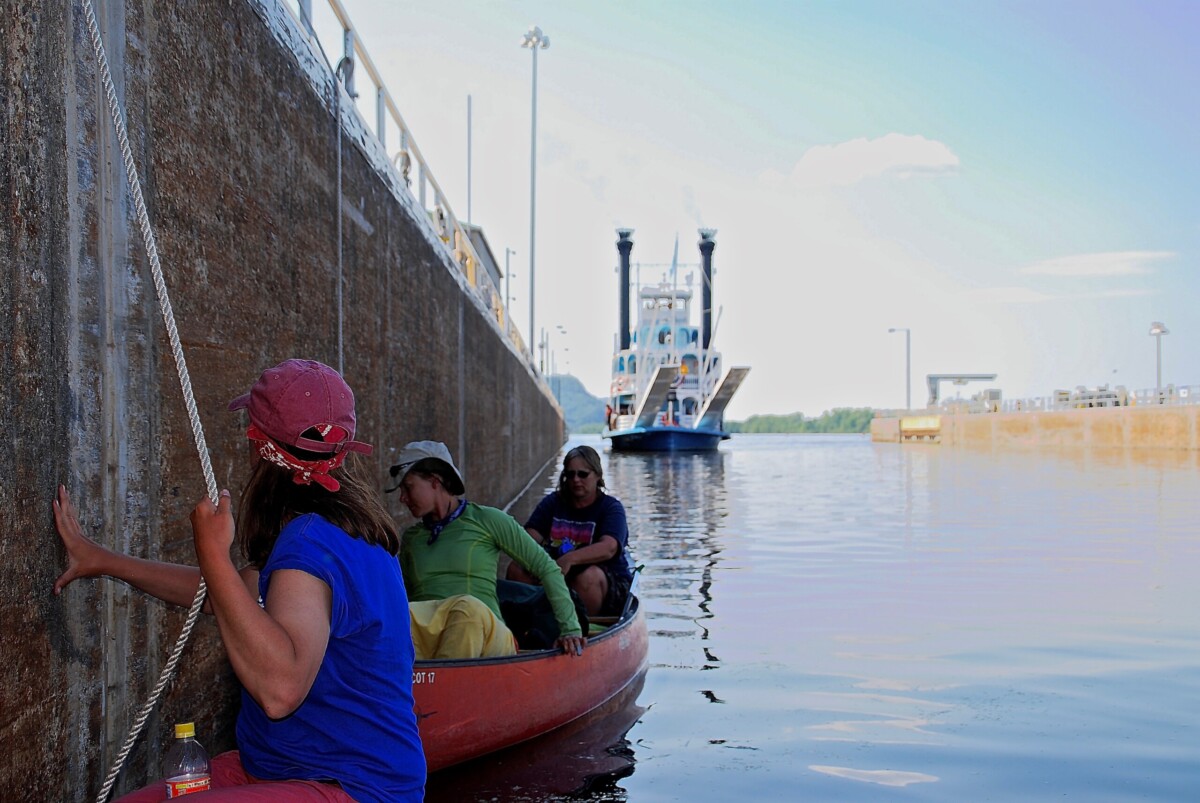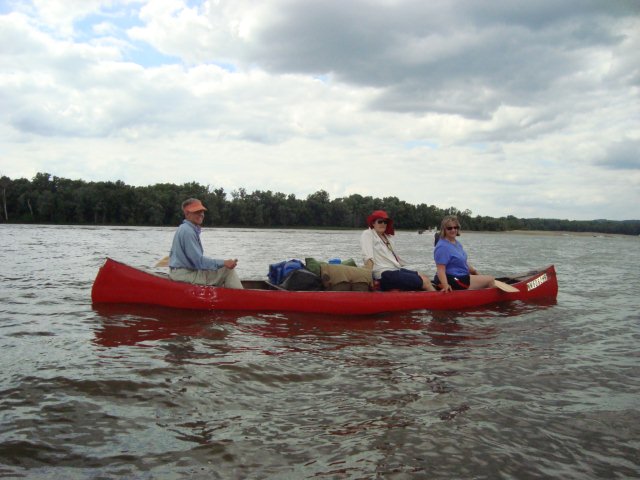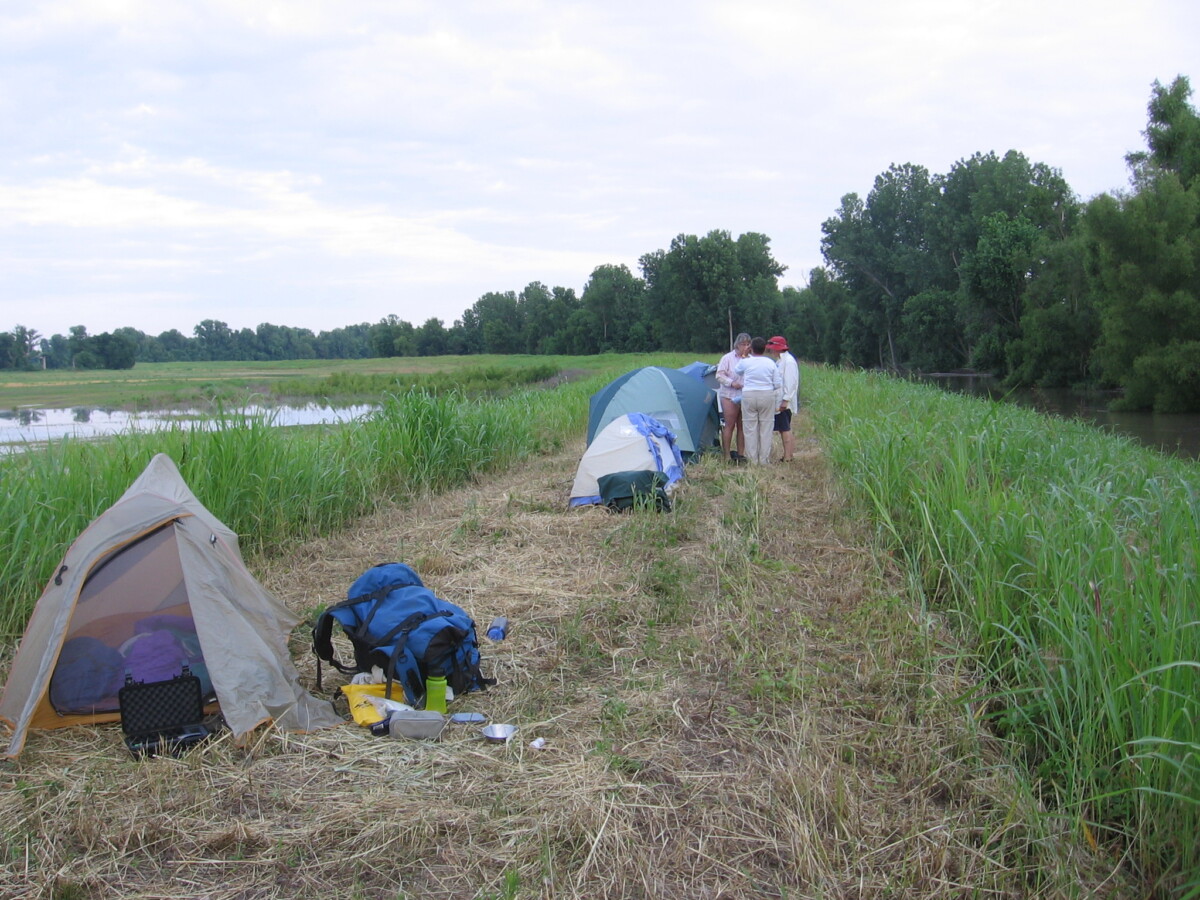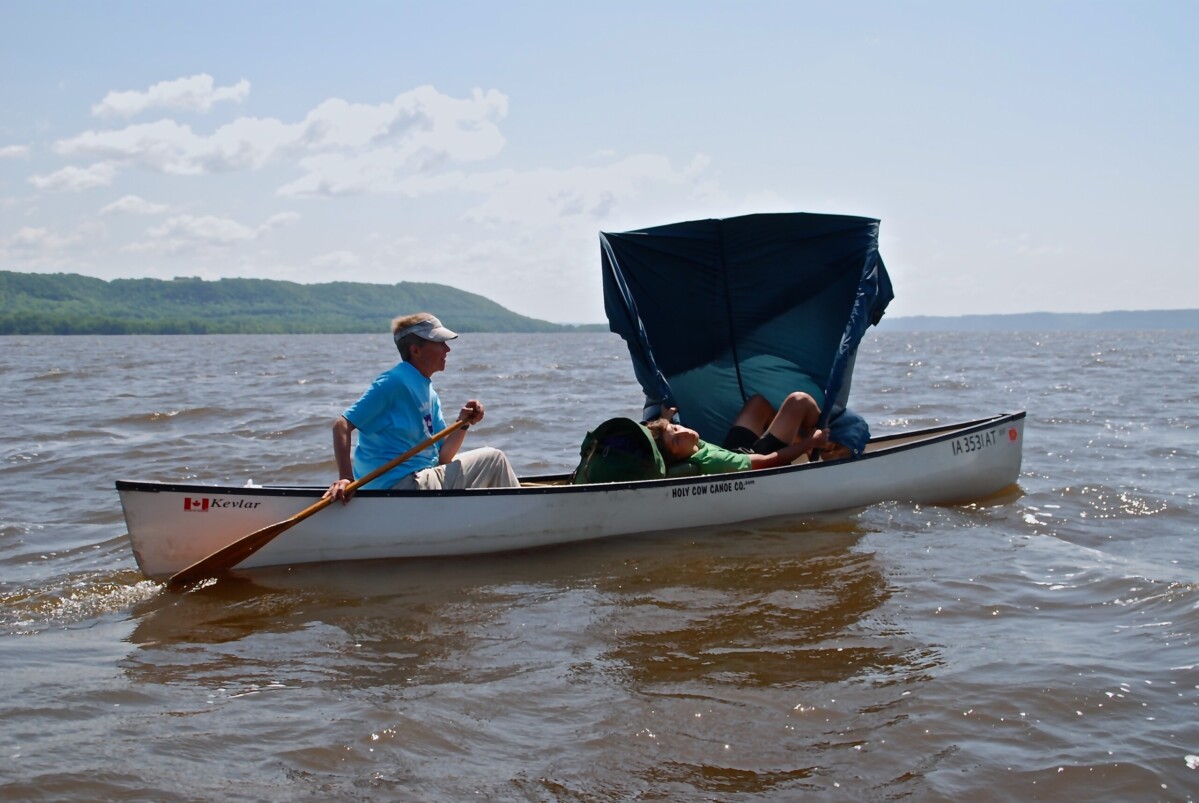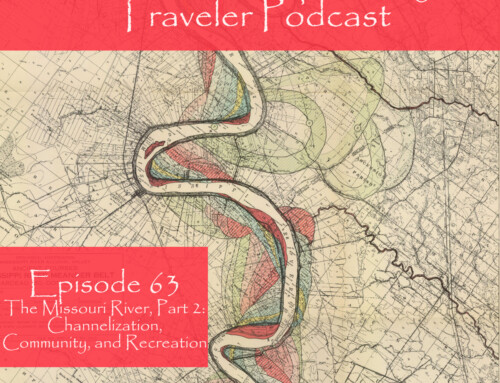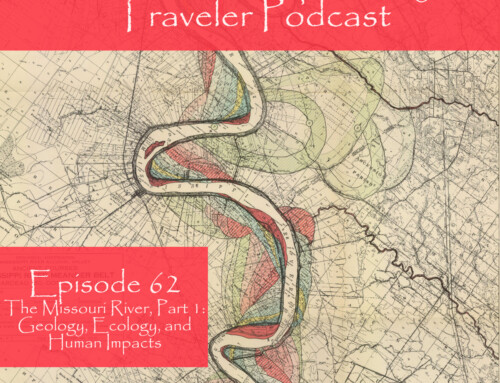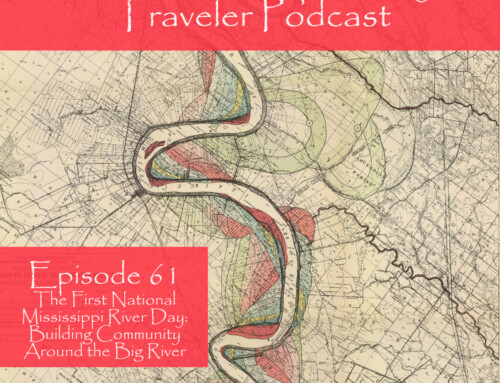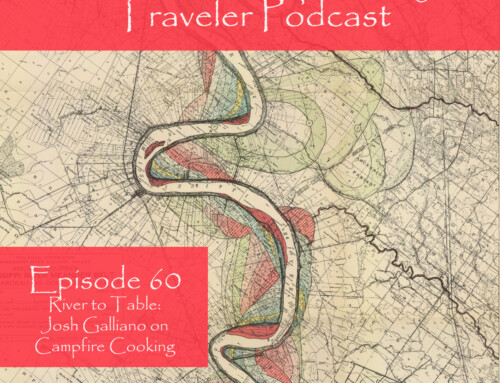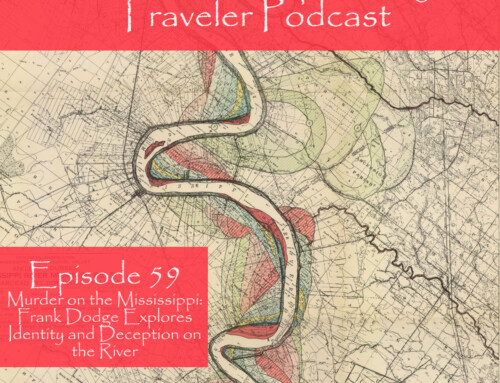Every year, dozens of people load up their canoes or kayaks and set out to travel the length of the Mississippi River. Anne Sherve-Ose and two friends took a different approach. Over the course of 13 years, they paddled the Mississippi River one week at a time. In this episode, I talk with Anne Sherve-Ose about those trips. She describes how the trips evolved and changed over time, shares an episode where they got stranded, and talks about the joys she experienced being on the river. We also talk about her history with outdoor adventures and taking adolescents and young adults on wilderness experiences, including a community college course she taught that included a week-long expedition in the Boundary Waters Canoe Area; students on that trip completed art projects to describe their personal experiences while camping and canoeing.
Show Notes
Anne Sherve-Ose’s books:
- Mississippi Misadventures: Thirteen Trips of a Lifetime
- 50-Day Exile
- Junior’s Big Adventure
- A Drop in the Bucket: Coast to Coast in a Canoe
- The Big, Wide Red
Order a book and learn about her trips at annesherveose.com.
Support the Show
If you are enjoying the podcast, please consider showing your support by making a one-time contribution or by supporting as a regular contributor through Patreon. Every dollar you contribute makes it possible for me to continue sharing stories about America’s Greatest River.
Don’t want to deal with Patreon? No worries. You can show some love by buying me a coffee (which I drink a lot of!). Just click on the link below.
Transcript
Sun, Oct 20, 2024 11:53AM • 50:30
SUMMARY KEYWORDS
Mississippi paddling, Anne Sherve-Ose, outdoor adventures, camping trips, Outward Bound, Boundary Waters, wildlife encounters, river dangers, canoeing, kayaking, river preparation, trip planning, river wildlife, Mississippi River, Hudson Bay
SPEAKERS
Dean Klinkenberg, Anne Sherve-Ose
Anne Sherve-Ose 00:00
As we’re paddling along, people on the shore always hail us, and, you know, say, Where are you going? Where are you from? What are you doing? And we as a joke, we’d say we’re going to New Orleans, and they, you know, drop their jaws. But then after we had said that enough times, I think we started to believe it that we really were
Dean Klinkenberg 00:47
Welcome to the Mississippi Valley Traveler Podcast. I’m Dean Klinkenberg, and I’ve been exploring the deep history and rich culture of the people and places along America’s greatest river, the Mississippi, since 2007. Join me as I go deep into the characters and places along the river, and occasionally wander into other stories from the Midwest and other rivers. Read the episode show notes and get more information on the Mississippi at MississippiValleyTraveler.com. Let’s get going. Welcome to Episode 51, of the Mississippi Valley Traveler podcast. Well, today we’re going to be talking paddling again, and this one, I’m really excited to bring you. So many of the experiences we hear about folks who paddle the Mississippi are from people who attempt to do the whole river in a single trip. So they may take 10 weeks, 12 weeks, maybe a bit longer, and paddle from source to sea all in one shot. Well, the show today, I’ve got Anne Sherve-Ose who paddled the Mississippi River in its entirety, but by doing it one week at a time with friends. So it took them, I think, 13 trips, beginning in 2004 and they managed to see the entire Mississippi from the headwaters to the Gulf. So in this episode, Anne shares her experiences doing that and how those trips came about, a few of the things they did to prepare for that trip. She shares a couple of stories of things that happened to them along the way. Of course, there have always got to be a couple of good stories. But we also talk more generally about her interest in the outdoors, how she got interested in outdoors in the first place, the work that she’s done taking kids out on camp, you know, multi day camping trips, and what she learned from from those trips, and the kinds of kids that she got out in the woods. Just it’s a very interesting, you know, conversation about her life experiences and her experiences with the outdoors and with paddling specifically so enjoy it. I know this gives me hope that maybe someday I’ll be able to see the entire Mississippi from the seat of a canoe, but I probably will be like her, and it’ll be by doing a series of trips rather than one long shot. As always, thanks to those of you who show me some love through Patreon. You not only keep this podcast going, you make me smile. If you want to join the Patreon community, you can go to patreon.com/deanklinkenberg, and you can join it there for as little as $1 a month. And what that gets you right now is early access to each of these podcast episodes. Don’t really like the Patreon thing? Well, you can buy me a coffee. So go to MississippiValleyTraveler.com/podcast and you’ll find a link there to feed my caffeine habit, which also makes me smile. At that same link, MississippiValleyTraveler.com/podcast you’ll also find the show notes and a list of all of the previous 50 episodes. So go to town, binge them. Spend, spend a couple days going through all these episodes and learning all you can about the Mississippi River. And now on with the interview. Anne Sherve-Ose has led an adventurous life, and we’re here to hear more stories about that today, particularly as they relate to the Mississippi. She’s lived and worked internationally. She’s worked as a teacher and as a wilderness guide, and she has had some remarkable long distance paddling trips, and that’s really what caught my attention, and we’ll be digging into that in just a little bit, but, but first, welcome to the Mississippi Valley Traveler podcast. Anne,
04:33
Thank you, Dean. It is an honor to be on your show here.
Dean Klinkenberg 04:36
You know it is such a it’s a delight to talk to you, one of the things that got my attention, and I think this probably just speaks to me, because I probably will do something similar. I like that your approach, that you were able to paddle the entire Mississippi, but you did it in segments, rather than trying to conquer it all at once. So we’ll come back to that a little bit later, but for now, I’m just sort of curious how you got so hooked on the outdoors. Were you active with outdoor stuff when you were growing up?
05:09
When I was a kid, we always went camping because we were kind of poor, and if we wanted a vacation, it was a camping vacation. And then in high school, I always like to go camping and hiking and stuff, but my high school friends weren’t really into that kind so I I did stuff with my brothers quite a bit, and I did stuff by myself quite a bit. Then when I got to college, I found people who had similar interests.
Dean Klinkenberg 05:42
So when did you get interested in kind of doing these longer trips, multi day, you know, camping and paddling?
05:51
Well, I, at one point, I worked for Outward Bound, and that was our modus operandi. It was to take basically a month out of people’s lives and be in the wilderness with them. So multi day trips I’ve done forever. I love camping. I love the camping part. It’s the funnest part. And so if I can camp for weeks on end, it’s like being in heaven.
Dean Klinkenberg 06:29
What is it you enjoy so much about the camping experience?
Anne Sherve-Ose 06:32
I think I was thinking about this the other day. I think it’s just getting to a place and kind of making it your own. And, you know, setting up your tent, and it’s, it’s like playing house here, the kitchen’s going to be here, and, you know, the the good view is over here, and the bathrooms back there. And it’s just like a new, you’re moving into a new house every day. I just think that’s fun.
Dean Klinkenberg 07:00
Yeah, and you can choose wherever you want to build your house too, I guess, right? So it seems like you’ve kind of had this mix where you you’ve had sort of, let’s say, the recreational interest in being doing things outdoors, but you’ve also had these jobs that allowed you to do some of that professionally, like with Outward Bound. I read on your website that you you took some kids up to the Boundary Waters for a week long trip, and then had them use art to express their feelings about the trip.
07:34
Yeah, this is when I was teaching at a community college, and we offered this boundary waters trip as a humanities class. I didn’t, I wasn’t qualified to be, to have it be a PE class. So we, we had the students interpret the Boundary Waters through poetry, drawing, sculpting, music, what, whatever they wanted to um, however they wanted to do it in a fine arts kind of way. So it put a little different um tilt to the trip, because they were always trying to look for creative things, which I thought, um was a good challenge for them.
Dean Klinkenberg 08:21
Were they kids that had some experience with the outdoors like that, or was it mostly new for them?
08:26
It was mostly new. Yeah, none of them had ever been to the Boundary Waters. Now, they might have been camping before, but the Boundary Waters is kind of a unique spot in the world, so a lot of people’s idea of camping is, you know, driving someplace and getting out and setting your tent up on the gravel. But as far as the expedition part of it, no that that was totally new.
Dean Klinkenberg 08:58
What what kinds of things do they express about the experience, and what did they, what did their art, artwork tell you about their experiences?
09:09
One of the things they had to do was keep a journal, and that gave us really, it was really an eye opener into what they were going through, and most of them changed a lot from the beginning, which, you know, was kind of like, this is stupid, and to the end, where they were appreciating their environment a little bit more. But they also, you know, some people, were natural artists of the, you know, art of painting and drawing, and they came up with some really nice, nice stuff. The music part. I was the music teacher in this outfit, and no one, no one would do a music project because it was too hard, except, except what they would do sometimes is write a song and then the whole group would sing it, and that that was fine.
Dean Klinkenberg 10:12
Oh yeah, that’s fun too. So I guess the big question is, would any of those kids ever go back to camping that way again in the future?
10:23
I think, I think some of them would, some of them would, would never, ever do it again. But yeah, I think for a lot of them, especially because of the beauty of the Boundary Waters, I think they were touched in a way that they hadn’t been before, and I expect to go back.
Dean Klinkenberg 10:45
So kind of based on your experiences with Outward Bound and with that Boundary Waters trip and all and all the work that you’ve done like what have you found has been sort of an entry point for getting kids who may not have a lot of background with your outdoors interested in that?
11:01
Well, you have to really sell them on the fun part. That’s really, really going to be fun. And you can be with your friends and all that in the middle of a sweaty swampy portage. You know, they don’t realize the fun aspect of it, but you know, you you say, Oh, you’re we’re gonna have campfires every night and cook, cook it around the campfire, and fish and swim and and all those things do come true. You just don’t tell about the bad parts that are going to happen, the rain and the bugs, the swamps.
11:08
Right, you can’t lead with those long, sweaty portages and mosquitoes like you gotta maybe, like they, maybe they can find out more about that once they’re there.
Anne Sherve-Ose 11:56
And then, then I say, oh boy, I forgot to tell you about that. That’s, that’s just one of the side aspects of it. It’s, you know, it’s not that important.
Dean Klinkenberg 12:09
So has paddling always been part of your outdoors experience? Then, like, were you interested in canoeing or kayaking, kind of from a fairly young age, too?
12:18
My family had a canoe, but I grew up in North Dakota, so canoeing in North Dakota is kind of different from canoeing Minnesota. I mean, you have these very sluggish, green rivers, and that’s what you can canoe on. But I, I learned to canoe there, and then, you know, I, I was very comfortable in the canoe. And then when I got to college, I started working at different camps and that where canoeing was the main mode of transportation. And, yeah, I just it just grew from there, but I felt like I had a good basis before I ever started doing that.
Dean Klinkenberg 13:05
Do you consider yourself like a more of a canoe person, or more of a kayak person at this point?
Anne Sherve-Ose 13:09
More of a canoe person.
Dean Klinkenberg 13:11
Yeah, me too.
Anne Sherve-Ose 13:13
But you can’t carry very much stuff, and you know, you have to portage your own boat all the time when you’re kayaking. So I guess I like the camaraderie of canoeing. Also, when I can’t find a friend, kayaking is fine. I take my dog,
Dean Klinkenberg 13:37
Good companion out there on the water.
Anne Sherve-Ose 13:39
Yep.
Dean Klinkenberg 13:41
So when did you get the idea to start paddling the Mississippi?
13:45
Well, my friend, who had been my college roommate, called me in 2003 and asked me if I wanted to canoe to the Twin Cities from Itasca. I said, sure, and we didn’t have a plan at that time to go past the Twin Cities, and it took us four years of a week a year to get there. And then, because I was from Iowa, I said, let’s just go go some more till we get to Iowa. And they said, Okay, so we went a couple more years. And then one of one of the girls had lived in Saint Louis, and she said, let’s just go to Saint Louis, because I got a lot of friends there and but I don’t want to go any bit past Saint Louis, because it’s hot and buggy and river is terrible. And we said, Okay, we’ll just go to Saint Louis. So we got to Saint Louis and and then the first friend and I started making plans for going on. And the one that wanted to stop at Saint Louis kind of said, hey, hey, wait for me. She joined us, and then we kept going. It just kind of morphed into doing the whole thing.
Dean Klinkenberg 15:11
So it didn’t start as a grand plan to do the whole river one week at a time?
15:15
No, but as we’re paddling along, people on the shore always hail us, and, you know, say, Where are you going? Where are you from? What are you doing? And we as a joke, we’d say we’re going to New Orleans, and they, you know, drop their jaws. But then, after we had said that enough times, I think we started to believe it, that we really were.
Dean Klinkenberg 15:41
So what year was that first week on the river?
Anne Sherve-Ose 15:44
2004.
Dean Klinkenberg 15:46
2004, alright, so that first week was from Itaska to, how far did you get that first week then?
Anne Sherve-Ose 15:54
Cass
Dean Klinkenberg 15:55
Cass Lake.
Anne Sherve-Ose 15:56
I think that’s where it was.
Dean Klinkenberg 16:00
That’s a tough stretch anyway.
16:02
Yeah, there were trees across the whole river and bunch of old wrecked dams. And, yeah, it was shallow, and it’s kind of like paddling in North Dakota, actually.
Dean Klinkenberg 16:14
So you were right at home. Then I guess so the we were most of the paddle trips in about a week long?
16:25
Yeah, a week or eight days, because we all had jobs. Two of us were teachers, so we had the summers off. But the third one, she only got a week off. So we had to accommodate her.
Dean Klinkenberg 16:43
So what did you have to do to prep for, for the for those week long trips?
Anne Sherve-Ose 16:48
Well, food was a big thing, and it’s looking back now. It’s really things changed so much because we used to cook with a fire and a and a cook kit every night and And lately, when we’ve been paddling lately, we have dehydrated meals in a bag and never even have a fire unless there’s a reason to. And we started out with aluminum canoes, and, you know, then we progressed to kevlar. We started out with no cell phones and ended up with satellite phones and garmins and stuff. So the the overall flavor changed a lot in those 13 years. But preparation, my husband always said, You are either planning your trip or you’re paddling or you’re planning for the next trip, that’s all you do. Because we you know, we have to plan how we’re going to get there, how we’re going to get home, who’s going to do what? Who’s canoes we’re going to use? Who’s going to bring what food? And one of the girls, the one that lived in St Louis, hadn’t been canoeing before, so she was a total novice. So we had to, you know, kind of accommodate that. But by the end she was, she was great.
Dean Klinkenberg 18:28
How many of you would would it be three of you, generally, that would be doing those week long trips?
18:32
Three of us, always. And then sometimes we bring other people who were interested. So we sometimes we’d have one canoe, sometimes we’d have two canoes, three canoes, two canoes and a kayak, just depending on who wanted to go. Most people, though, after they went one year, they said, thank you and didn’t want to go. It takes a certain kind of person who thinks that’s it’s fun to be dirty and sweaty all the time. I mean, I I can tell. I can tell, talking to people immediately if they would work or not work with. And when you you asked me earlier, that’s the main thing that I learned, is that you have to paddle with people that you get along with, that you like because if you are stuck in a boat or on a trip with, with people you can’t stand it just will never work.
Anne Sherve-Ose 19:47
You probably have to abort the trip. And the three of us that did this, Mississippi, all, the whole thing never, well, I should say, rarely really got into a fight, and if we did, it was about some really stupid thing, but never, never totally at odds about anything.
Dean Klinkenberg 19:47
Right. So do you pick up any tips about how to screen people for that? I mean, apart from the like the three of you like, because I, when I think about that, it’s like, I’ve got some friends that I get along really well with, but there’s no guarantee that we would be compatible on a trip like that.
Anne Sherve-Ose 20:27
Um, well, no, we didn’t have a screening method, but whichever friend it was, you would say, oh, yeah, so and so is really wants to go, and she’s really fun, and she she would do blah, blah, blah, blah, so the rest of us just kind of buy into it. And usually that worked okay. One time it it was a disaster, just a total disaster, and that was my friend, so it was my fault. But luckily, she only, she only was with us for half of the week, and then she was going to trade places with another person. So after three days, we switched, and then everything was good.
Dean Klinkenberg 21:14
It I think for folks who’ve never done anything like that, it’s hard to imagine. It’s hard to picture what the experience is going to be like, because, like you said, there are no showers available, and you may be using your toilets, may be sandbars, and a lot of folks are used to their daily comforts.
21:34
Yeah, you just have to acknowledge that you’re not going to have any daily comfort. You’re not going to have running water, you’re not going to have soap, You’re not going to have TV, you’re not going to have music on your iPads, but but you have all this other stuff that takes the place, if you can, if the person is flexible and open to new experiences, they’ll be fine.
Dean Klinkenberg 22:06
Fantastic. Yeah. What do you think are some of the like core skills that you figured people really need to have or learn quickly for a trip like that?
Anne Sherve-Ose 22:16
Well, first of all, they need to someone in the group needs to be able to read a map. And some say, well, you just follow the river. You just go downstream. But it’s not always that easy. There’s a there’s some places where you are in a maze of islands and you don’t have a clue if you’re not looking at the map, you have to have someone in the stern, which is the back of the canoe, who knows what they’re doing, because it can be, it can be dangerous on that river, and you don’t really realize it, because you’re moving at the same speed as the water. So you don’t, you don’t realize the force that you have until you run up against something that’s not moving and and then, you know, it’s like, whoa that was a disaster in the making. So you have to have someone who can steer away from those potential problems. I’m, I’m, I’m very leery of people who just, who don’t know how to canoe, and just say, we’re just going to float the river, because that’s not the Mississippi is not a rive you should float. There’s it’s too big and there’s too much going on on it.
Dean Klinkenberg 23:47
Yeah, that’s a, that’s a debate I have with some friends of mine who I think we’ve been out on the river three times for overnight trips, at least a couple nights minimum, and they always refer to these experiences as float trips. And it’s like, no, this isn’t the Meramec River, or, you know, the Apple River, or, you know, these, this is a paddle trip. This is an expedition. You have to pay attention.
Anne Sherve-Ose 24:12
Yeah, one of the things on the Mississippi that I had no idea about before we started was the wing dams. Um. And even when people told us watch out for the wing dams, we didn’t know what they were talking about. But these are man made structures that are built to divert the water away from the shore, so the erosion isn’t such a problem. And if you if they’re if the water is low, you see these structures. If the water is high, you float over without even noticing. But if the water’s right in the middle, you you get caught in the boils of these and it can spin your canoe around in half a second. If you’re not paying attention, or someone in the boat isn’t paying attention, you could swamp just in the blink of an eye.
Dean Klinkenberg 25:11
So from, from your experience on these trips, like, other than like, you know, the the wing dams, what were some of the primary dangers you were really watching out for when you were on the river?
25:22
Floating objects like trees and cars, picnic tables, but we’re going the same speed as they are. We were paddling several years when it was flood stage and the river was closed to all barge traffic, which was really nice for us, because we could go wherever we wanted and not worry about anything. But you try to find a campsite when it’s flooded like that, and you’re over along the edge and you’re paddling through the forest trying to find a place you know, that looks like it could, you could crawl out and set up a tent there, and that that, even that is dangerous paddling through the trees, because, you know, you don’t have any idea what’s underneath there. So I like the flood stage, but it i It was kind of dangerous. We like the the drought years too, because there are sandbars everywhere. I mean, from one spot on the river, you could see camp, and it was time to camp,
Dean Klinkenberg 26:43
Yeah. Who needs those Gulf Coast beaches when you’ve got the sandbars on the Mississippi, right?
26:49
Yeah, yeah. And they’re full of tracks, all kinds of tracks, and turtle eggs and fish skeletons and snake skins. It’s just a bounty of stuff to look at on these sandbars.
Anne Sherve-Ose 27:10
The only thing, the water sometimes wasn’t as pleasant as the Pacific Ocean, maybe, or as cleanliness. But that didn’t stop us very often.
Dean Klinkenberg 27:27
Right. Mostly, it’s just sediment. But occasionally, if you’re down river of a sewer pipe, that’s probably not the best place to go for a swim.
27:33
When we were going through Minneapolis, we saw some some pipes coming out into the water, of the grossest looking stuff, and it looked like it had not been filtered or tended in any way. It was just as gooky stuff coming out. It’s pretty horrible.
Dean Klinkenberg 27:58
Yeah, unfortunately, we still have too much of that, but I think people still assume the river is a polluted mess all the way but that certainly hasn’t been my experience.
28:08
No, no. Even below St Louis, where we thought it was going to be really gross, the only places it was really bad was in the locks when, because they kind of catch everything and and then once you’re through the lock, and that’s nice, like fresh water again.
Dean Klinkenberg 28:39
Hey, Dean Klinkenberg here, interrupting myself. Just wanted to remind you that if you’d like to know more about the Mississippi River, check out my books. I write the Mississippi Valley Traveler guide books for people who want to get to know the Mississippi better. I also write the Frank Dodge mystery series that is set in places along the Mississippi. My newest book, ‘The Wild Mississippi’ goes deep into the world of Old Man River. Learn about the varied and complex ecosystem supported by the Mississippi, the plant and animal life that depends on them. And where you can go to experience it all. Find any of these wherever books are sold. So what was the what were your days like on that? Did you have like, a general goal for, like, a time you were trying to get on the water, and a time you’re a day you’re shooting for being off the water?
29:31
Well, we try to be on the water by seven, for sure, because it’s so pretty in the morning and not so hot and the birds are making a terrific racket early in the morning, and and then we would try to hug the hug the shore so we were in the shade till about 10, and then we would maybe eat lunch at 11 or so and and then paddle again till probably 330 or four. And we didn’t set out, you know, we didn’t say, okay, we’re at this town, and we’re going to get to this town today, because things always happen. But we would have, I mean, we knew where we thought we were going to end up at the end of the week. So we space out the we know we had to do, you know, 25 miles this day or so we had a good idea. But then you never know where you’re going to camp either. Sometimes you’d look for a campsite for hours, especially on those flood years,
Dean Klinkenberg 30:50
Right. Not so many dry patches of land to camp on when the river was high like that.
Anne Sherve-Ose 30:59
Can I tell you one story about that?
Dean Klinkenberg 31:01
Oh, absolutely.
Anne Sherve-Ose 31:02
We were north of St Louis, and it was a flood year, and we’d been looking and looking, and finally we saw this, like a steam shovel over on the edge. It looked like it was abandoned, but I think it was because there was water all around it, because of the flood. But right where it was, it was a gravel patch, and so we thought, okay, no one’s going to be using that steam shovel for for a while. So we pulled up by that gravel patch and set up our tents, and there it was on an island because the road was underwater, so we were kind of stuck on this island with this steam shovel, and we went to bed that night, And there’s a huge storm, and all of us, we each have our own tents. All of us were in our own tent trying to hold the four corners down spread eagle so they didn’t blow away and they didn’t. But in the morning, my my two mates came over and said Anne our canoe is gone.
Dean Klinkenberg 31:02
Oh, no.
Anne Sherve-Ose 31:21
And I no sure. And they said, Yeah, really. And, and we got up in our canoe. We had tied it at one end, but you never think your canoe is going to disappear. We had tied it at one end, but it was completely gone. And there we were on this island with this steam shovel and everything. Everything was flooded. So this was before cell phones. There was a dock, kind of by the steam shovel that had those black plastic blocks underneath it, and one of those blocks was loose, so I got on that black plastic block and paddled to shore, our paddles and life jackets and everything was we’re still there, just the canoe was gone. Paddled to and tried to find a house where there was someone, but everything was flooded, so that was fruitless. And so I came back, paddled back, balancing on this black cube. And after a while, a fishing boat came by, and the guy you know, we were hooting and hollering at him. He came over and rescued us, and of course, we didn’t have a canoe for him to port. It’s just our just our stuff, and he took us to the nearest place that had road access, and that was the St Louis Yacht Club.
Dean Klinkenberg 34:00
Oh, sure. And so we went in this yacht club, all filthy, muddy, you know, no car, no nothing. And, and kind of crashed, the crashed the party. But then one of the girl’s husbands came and picked us up there. So did the the canoe ever turn up?
Anne Sherve-Ose 34:21
No, and we looked for it for years after that, you know, we thought, oh, it’s up in the trees somewhere in bright red. And we’d see these red things in the trees, but they were always the navigation buoys that had broken loose and were up in the trees. So no, we never did find it.
34:39
The river took it.
Anne Sherve-Ose 34:43
Had to buy a new old canoe.
Dean Klinkenberg 34:47
Wow, see, I it’s, it’s easy to forget, like in those days before cell phones, people still found a way to manage, right?
Anne Sherve-Ose 34:56
Yeah, it wasn’t, it wasn’t pretty, but. So it was a in retrospect, it’s pretty funny.
Dean Klinkenberg 35:06
Do you have any other stories you want to share that like things that really impressed you from those trips, or great stories about wildlife, or anything of that kind?
Anne Sherve-Ose 35:16
Well, yeah, I’ll tell you one story about wildlife. We’re going paddling through the University of Minnesota campus, and we had two canoes at that time, and there’s people out on the lawn picnicking. And, you know, it was a beautiful day, and there was this huge commotion up in front of us, and it was a duck that was just flapping, flapping and squawking and flying in circles, and I’m really panicking. And we thought, what is wrong with that duck? We got up to her, and she had a bunch of babies with her. But under the water, it wasn’t very deep, maybe not even two feet at that point. One of her babies had gotten its foot stuck in a rock between two rocks underwater, and the baby was down there trying to get loose, and the mom was up on the surface trying, trying to call the baby up to the surface. So one of the girls in the other boat just reached down with their paddle and kind of pried the rock away, and the baby shot up into the air, and everyone swam away. All was well.
Dean Klinkenberg 36:42
Little wildlife rescue while you’re out there. Yeah, fantastic. Did you see very much wildlife on these trips, in general?
Anne Sherve-Ose 36:51
Tons of birds. I mean, it’s, it’s not called the flyway for nothing. It’s just birds every minute of the day. We saw lots of deer. We saw some otter. We did not see any bear. We saw raccoons, but mostly, mostly it was birds and snakes.
Dean Klinkenberg 37:26
Plenty of snakes. Yeah, during the so you, you had these week long trips over the course of several years. Then, like, how did your, if at all, like, how did your view of the Mississippi change as a result of all those trips?
Anne Sherve-Ose 37:42
Oh, well, that the general flavor of the Mississippi is so different down south. Like I said earlier, it was, it was like paddling in North Dakota at the beginning and and in in central and southern Minnesota, it was just so pleasant and nice. And then down south, the river got so wide that you you wouldn’t even consider crossing from this side to the other side to look at a campsite so far away you couldn’t even see if there were campsites on the other side. And then the boat traffic got so ridiculously heavy that it was especially between Baton Rouge and New Orleans. It was like a a death trap in there, because there were ocean going ships coming up to Baton Rouge, and there were all the barge trains coming down from Minnesota, and all the tugboats crossing east to west and west to east, and the huge waves that all of those, those three things made, were just kind of compounding against each other. So it was, it was like being in the North Sea. It was really scary going through that passage.
Dean Klinkenberg 39:22
So that’s a good 100 miles, I think, right from Baton Rouge to New Orleans itself.
Anne Sherve-Ose 39:28
Yeah, it was, it was it, I can’t remember where we stayed between those two, but yeah, it was, it was white knuckling almost that whole stretch. And I said to the when we finally got past all that commotion, I said something to my to my friends, about how harrowing that had been, and they’re like, What? What are you talking about? Because they’re up in front. They’re just paddling away, and I’m I’m just beside myself trying to avoid the waves and the boats and the wind and, oh, I mean, it was for me that was a terrible experience going through there.
Dean Klinkenberg 40:16
And that’s why a lot of that’s why a lot of those long distance paddlers choose to go down the Atchafalaya instead of going through Baton Rouge to New Orleans, but…
Anne Sherve-Ose 40:26
Yeah, we had some riverboat captains advising us not to do this and not to do that and go this way and that way and but we did what we want, what we wanted.
Dean Klinkenberg 40:40
Yeah, so did you? Did you end your trip in New Orleans, or did you go all the way onto the Gulf?
40:46
We went all the way to the Gulf, and we got down past Venice and and then it’s just all that’s where the road ends. And after that, it’s just all these man made channels. I mean, there’s 100 options to get to the Gulf from Venice, and so we just picked one and and, you know, followed the map and got out to the ocean, and all of a sudden, all the commotion that we’d been having for 13 years, it just stopped, and we’re just floating on this glassy there weren’t even any swells or waves or anything. It was just like the world ended. And it was, it was such a contrast, and it was very emotional for all of us at that point, because it’s like it did we always do the analogy to life. You know that you’re you’re going through life and all these, you have all these problems and situations to solve, and then at the end, it’s just peaceful, peaceful and calm.
Dean Klinkenberg 42:11
Right. But it’s also like that moment can be kind of bittersweet too, right? Because you’ve reached the end, but, but wait, this is the end.
42:17
Yeah, we did have to. We camped there on this little sandbar made of seashells one night, and then we had to turn around and go back to Venice, because that’s where we were going to get picked up. So we paddled back away from the ocean for a day. So we had time to think of everything.
Dean Klinkenberg 42:44
Yeah, well, it seems like you you didn’t run out of ideas for more adventures when you finished the Mississippi trip, though.
42:54
Well, actually, I think all three of us were like that last that last leg, we took two and a half weeks to do that instead of one week, because we said we’ve got to get this over with. We’re getting so old. And so then we finished, and that was it for six years. And I bought a cabin in northern Minnesota, where I am right now. And I thought, I’m not, I’ll go, No no more a roving. And then got the bug again. So we got out our canoe and now we’re paddling to Hudson Bay.
Dean Klinkenberg 43:37
Wow, that’s a very It seems like that’s a very different challenge than the Mississippi.
43:44
Yeah, there’s, yeah, it’s, it is different. And in fact, last year was our third and supposed to be our final, triumphant year, going, reaching the Hudson Bay, and we wiped out. And we have to go another year. We’re about two weeks from the end.
Dean Klinkenberg 44:09
All right, so what’s the route that you’re taking for that?
44:11
Oh, we’ve been on the Hayes river. We went up the Red River from the the headwaters at Big Stone Lake between South Dakota and Minnesota. Went up the Red River up to Winnipeg, and then up Lake Winnipeg, and then on the Hayes River to Hudson Bay.
Dean Klinkenberg 44:39
So you got to paddle back through your home state again a little bit.
44:42
Yeah, that was that was funny, because on the left side of the river, it’s just no trees, no water. What do you call the the. Strip where you try to keep the water from well, not levees, but buffer strips along the the North Dakota side and the fields would come right down to the water, and on the right side of the river, here’s all these green trees and grass and buffer strips. And it was very different. The two approaches to the Red River.
Dean Klinkenberg 45:29
Wow. And then you get up into part, you know, you probably don’t have to go too far into Canada, and you’re getting to into some pretty remote country,
Anne Sherve-Ose 45:38
Yeah. And then we were in the French maybe, in part, which was, I had no idea there was so much French influence right there on the Red all these little towns had their French Catholic churches built right on the river, and all the towns were named French names. So that was like in a being in a different country there. Hit Lake Winnipeg, and that lake is so gorgeous. Talking about white sand beaches, that whole lake is full of white sand beaches. I couldn’t have imagined that, that there weren’t resorts all up and down that lake, because it is so gorgeous. Hardly any towns well, and the towns there are, at least on the north half, are all Indian reserve.
Dean Klinkenberg 46:37
All right. Wow. That is a very different experience well, and I know, like, music has been a big part of your life. When you’re on trips like this, do you bring along an instrument? Or, like, is music a part of these trips at all?
Anne Sherve-Ose 46:51
Music is a huge part of the my two friends and and me when we’re canoeing, because we like to sing, and every every little thing reminds us of a song. So someone burst into a song, and then everyone joins in, and we sing rounds. And it’s kind of bad, because the the people in the front are singing forward, I and I in the back, can’t hear them, so I think I’m singing with them, but we’re all we’re really off. But even when we stop, we like, if it’s ringing, we sing and sing.
Dean Klinkenberg 47:35
But are you writing your own songs along the way? Are these like songs that you just know from other places that you’re singing.
47:42
Mostly camp.
Dean Klinkenberg 47:44
Yeah
Anne Sherve-Ose 47:45
I was a Girl Scout, and we’re all of the same age, so we we know the same
Dean Klinkenberg 47:54
You share a songbook, Huh?
Anne Sherve-Ose 47:57
Yeah, a mental songbook.
Dean Klinkenberg 48:01
Well, well, Anne, this has been fantastic. I really enjoyed hearing about your experiences. I know you’ve got some books that you’ve written as well. Would you? Would you like to tell folks a little bit about the books that you’ve written and where they can find them?
Anne Sherve-Ose 48:14
Sure. The book about the Mississippi trip is called ‘Mississippi Misadventures: Thirteen Trips of a Lifetime’ and its written by me Anne Sherve-Ose and it is available from me Anne Sherve-Ose. It’s not on Amazon or anywhere else because it’s self published. And I have a website where you can find it. It’s annesherveose.com. I also wrote a book about staying at my cabin through ice up, where the the period of the year where you can’t get in and you can’t get out because the ice isn’t thick enough. So it was, I was kind of like a captive in my cabin for 50 days. The name of that book is ’50 Day-Exile.’
Dean Klinkenberg 49:19
Well, Anne, thank you so much for your time. This has been great.
Anne Sherve-Ose 49:23
Was really fun reliving all this stuff. Thank you for inviting me.
Dean Klinkenberg 49:30
Thanks for listening. If you enjoyed this episode, subscribe to the series on your favorite podcast app so you don’t miss out on future episodes. I offer the podcast for free. But when you support the show with a few bucks through Patreon you help keep the program going, just go to patreon.com/deanklinkenberg, if you want to know more about the Mississippi River, check out my books. I write the Mississippi Valley Traveler guidebooks for people who want to get to know the Mississippi better. I also write the Frank Dodge mystery series that’s set in places along the river. Find them wherever books are sold. The Mississippi Valley Traveler podcast is written and produced by me Dean Klinkenberg. Original Music by Noah Fence. See you next time you.
